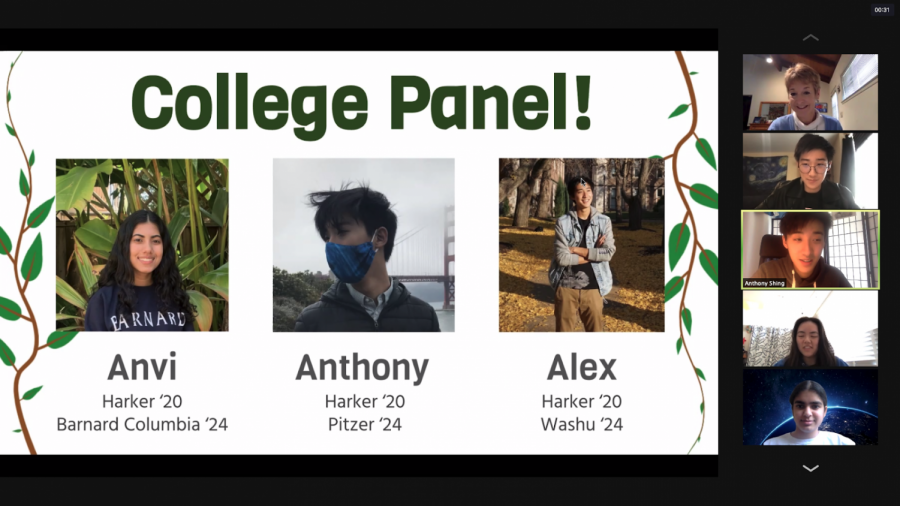Green Team holds college speaker panel on sustainability
Current Green Team officers led a Q&A session with Anvi Banga (’20), Alex Shing (’20) and Anthony Shing (’20), freshmen at Barnard, Washington University in St. Louis (WashU) and Pitzer College, respectively, who talked to current club members about their environment work in college.
March 8, 2021
The upper school Green Team hosted a college panel with club alumni on creating sustainable change in a university setting last Friday.
Current club officers led a Q&A session with Anvi Banga (’20), Alex Shing (’20) and Anthony Shing (’20), freshmen at Barnard, Washington University in St. Louis (WashU) and Pitzer College, respectively, who talked to current club members about their environment work in college.
At Barnard, Anvi worked on a sustainability rating system of companies that students on campus were looking to work at, and at WashU, Alex has worked with local environmental advocacy efforts within the St. Louis community. At Pitzer, Anthony worked as the environmental representative this year in the student senate, meeting with the sustainability committee, which is a group of faculty at Pitzer that manages sustainability initiatives.
“It was really interesting to hear their perspective on climate advocacy and how their view of it shifted from high school to college,” Siddhi Jain (9), who attended the event, said. “It caused me to apply what I’m learning in school a little bit more and try to get more people involved in what I’m doing.”
The three talked about ways that the community can continue sustainability efforts at the upper school through the pandemic, looking at ways to incorporate learning into community service.
“Community service is really important. Surrounding and incorporating community action into education is very fundamental in a sense that it gets people to actually see the issues at hand,” Alex said during the event. “At Harker, we live in a very enclosed bubble, so often [times], you get stuck in an educational atmosphere, but by actually seeing the effects of what we’re learning, specifically on the environmental path, then I think people will not only learn about it but also see and implement solutions within those communities.”


















![“[Building nerf blasters] became this outlet of creativity for me that hasn't been matched by anything else. The process [of] making a build complete to your desire is such a painstakingly difficult process, but I've had to learn from [the skills needed from] soldering to proper painting. There's so many different options for everything, if you think about it, it exists. The best part is [that] if it doesn't exist, you can build it yourself," Ishaan Parate said.](https://harkeraquila.com/wp-content/uploads/2022/08/DSC_8149-900x604.jpg)




![“When I came into high school, I was ready to be a follower. But DECA was a game changer for me. It helped me overcome my fear of public speaking, and it's played such a major role in who I've become today. To be able to successfully lead a chapter of 150 students, an officer team and be one of the upperclassmen I once really admired is something I'm [really] proud of,” Anvitha Tummala ('21) said.](https://harkeraquila.com/wp-content/uploads/2021/07/Screen-Shot-2021-07-25-at-9.50.05-AM-900x594.png)







![“I think getting up in the morning and having a sense of purpose [is exciting]. I think without a certain amount of drive, life is kind of obsolete and mundane, and I think having that every single day is what makes each day unique and kind of makes life exciting,” Neymika Jain (12) said.](https://harkeraquila.com/wp-content/uploads/2017/06/Screen-Shot-2017-06-03-at-4.54.16-PM.png)








![“My slogan is ‘slow feet, don’t eat, and I’m hungry.’ You need to run fast to get where you are–you aren't going to get those championships if you aren't fast,” Angel Cervantes (12) said. “I want to do well in school on my tests and in track and win championships for my team. I live by that, [and] I can do that anywhere: in the classroom or on the field.”](https://harkeraquila.com/wp-content/uploads/2018/06/DSC5146-900x601.jpg)
![“[Volleyball has] taught me how to fall correctly, and another thing it taught is that you don’t have to be the best at something to be good at it. If you just hit the ball in a smart way, then it still scores points and you’re good at it. You could be a background player and still make a much bigger impact on the team than you would think,” Anya Gert (’20) said.](https://harkeraquila.com/wp-content/uploads/2020/06/AnnaGert_JinTuan_HoHPhotoEdited-600x900.jpeg)

![“I'm not nearly there yet, but [my confidence has] definitely been getting better since I was pretty shy and timid coming into Harker my freshman year. I know that there's a lot of people that are really confident in what they do, and I really admire them. Everyone's so driven and that has really pushed me to kind of try to find my own place in high school and be more confident,” Alyssa Huang (’20) said.](https://harkeraquila.com/wp-content/uploads/2020/06/AlyssaHuang_EmilyChen_HoHPhoto-900x749.jpeg)







